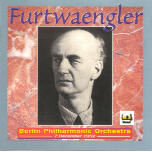Ah, the difference a day makes! The performance of Beethoven’s Third Symphony captured on tape (and also available from Tahra) the day after this December 7, 1952, concert is one of this conductor’s best played, best sounding, and most powerful interpretations of the work. Things go less well here. The first movement bogs down in the development section and never quite recaptures the energy of its opening. Intonation, particularly in the lower strings, sounds distinctly flat. The funeral march’s various episodes have the right character, but the march itself is flabby and directionless. Lastly, the finale has a sectionalized quality to it that is just the opposite of the next day’s achievement: a seamless span of closely argued music in which each variation follows inevitably on the one previous. In addition, the sound on this disc is also markedly inferior, being particularly compacted and cloudy in the finale (though much better than the broadcast average all the same). Furtwängler certainly was capable of delivering a magnificent “Eroica” and that’s just what he did on December 8. That’s the version you should hear.
































